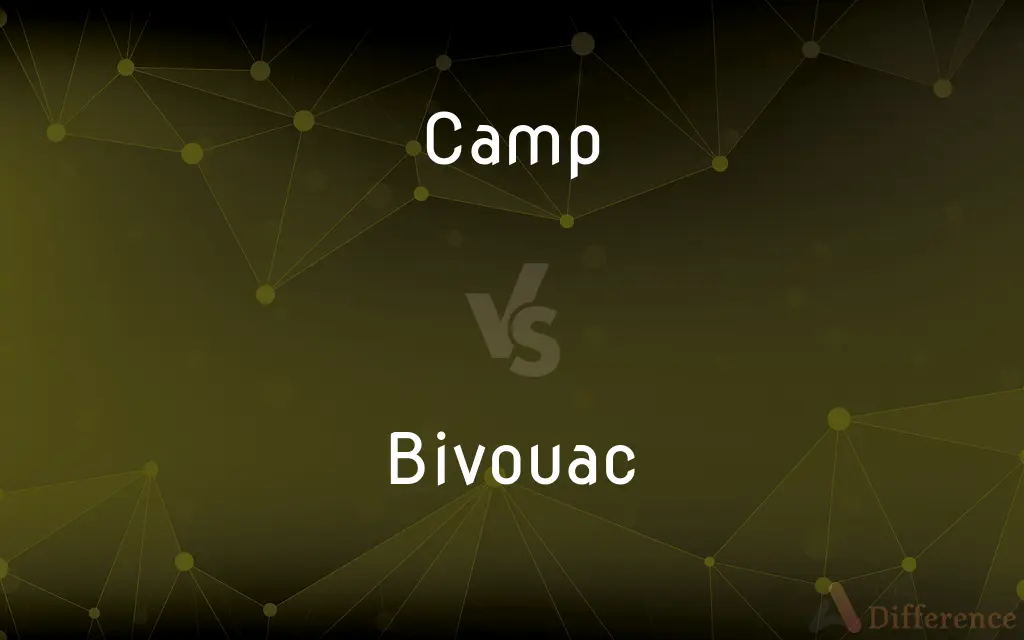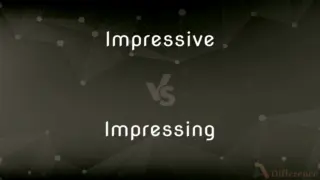Camp vs. Bivouac — What's the Difference?
By Fiza Rafique & Urooj Arif — Published on May 21, 2024
Camping involves setting up a temporary outdoor shelter, often for recreation. Bivouacking is a simpler, more improvised form of camping, typically without a tent, used in situations like climbing or hiking.

Difference Between Camp and Bivouac
Table of Contents
ADVERTISEMENT
Key Differences
Camping is a broad term that encompasses various forms of outdoor stays, ranging from recreational activities in established campgrounds with amenities to wilderness adventures. It usually involves setting up a tent or using a recreational vehicle (RV) as shelter. On the other hand, bivouacking, or bivy, refers to a minimalist approach to spending the night outdoors, often without a traditional tent, using minimal shelter like a bivouac sack, which is a waterproof cover for a sleeping bag.
Camping often implies a planned activity, possibly including family or friends, and can involve a variety of gear and supplies to ensure comfort, such as sleeping bags, portable cooking equipment, and sometimes even electricity and water hookups in developed campsites. Conversely, bivouacking is more about necessity and simplicity, primarily used by hikers, climbers, or soldiers as a way to rest during expeditions or missions where carrying a full tent is impractical due to weight or space constraints.
The choice between camping and bivouacking often depends on the nature of the outdoor experience sought. Camping allows for a more comfortable and leisurely outdoor experience, suitable for longer stays in nature with the possibility of multiple activities like fishing, hiking, or canoeing. Bivouacking is tailored for short-term, lightweight travel, focusing on the essentials and often used during challenging treks or climbs where quick, overnight stops are needed.
In terms of legal and environmental considerations, camping might require permits or fees, especially in national parks or private campgrounds, where specific rules must be followed to minimize environmental impact. Bivouacking, while more discreet and having less environmental impact due to its minimalist nature, may still be subject to legal restrictions, especially in protected areas or specific public lands, to preserve natural habitats.
The social aspect of camping, with its community-oriented nature, often involves shared campfire stories, meals, and activities, fostering a sense of camaraderie. Bivouacking, in contrast, is usually more solitary or involves smaller groups, focusing on the practicality of resting to continue the journey rather than the camping experience itself.
ADVERTISEMENT
Comparison Chart
Shelter
Tents, RVs, or cabins
Minimal or no tent, often a bivouac sack
Purpose
Recreation, leisure
Necessity, simplicity during expeditions
Gear and Supplies
Extensive, for comfort and leisure
Minimal, focusing on essentials
Duration and Activity
Suitable for longer stays, various activities
Short-term, focused on travel necessity
Legal Considerations
May require permits, fees
Subject to restrictions, usually permit-free
Environmental Impact
Depends on the campsite and practices
Minimal due to lightweight, leave-no-trace ethics
Social Aspect
Often community-oriented, group activities
Typically solitary or small groups
Compare with Definitions
Camp
Can include a variety of recreational activities.
Their camping trip included hiking, fishing, and canoeing.
Bivouac
An improvised campsite with minimal shelter, used by hikers and climbers.
They set up a bivouac on the mountain ledge to rest for the night.
Camp
The activity of staying outdoors in a tent, RV, or cabin for leisure.
They went camping at the national park to enjoy the weekend.
Bivouac
Often involves sleeping under the stars or in a bivy sack.
His bivouac setup included just a sleeping bag and a bivy sack.
Camp
Involves setting up a temporary residence in nature.
Camping under the stars is their favorite summer activity.
Bivouac
Focuses on simplicity and necessity during expeditions.
The climbers chose to bivouac to save weight on their ascent.
Camp
Often requires planning and preparation.
They packed all necessary gear for their week-long camping adventure.
Bivouac
Used for short, overnight stays in the wilderness.
The hiker bivouacked by the trail to resume his journey at dawn.
Camp
Encourages outdoor living and nature appreciation.
Camping taught them to appreciate the tranquility of nature.
Bivouac
Minimal environmental impact due to lightweight travel.
Bivouacking left no trace on the pristine alpine meadow.
Camp
A place where tents, huts, or other temporary shelters are set up, as by soldiers, nomads, or travelers.
Bivouac
A temporary encampment often in an unsheltered area.
Camp
A cabin or shelter or group of such buildings
Gathered branches and grasses for a makeshift camp.
Had a fishing camp in Vermont.
Bivouac
An encampment for the night, usually without tents or covering.
Camp
An outdoor place acting as temporary accommodation in tents or other temporary structures.
Bivouac
Any temporary encampment.
Camp
A single hut or shelter; as, a hunter's camp.
Bivouac
A temporary shelter constructed generally for a few nights.
Camp
Temporary lodgings in the country for travelers or vacationers;
Level ground is best for parking and camp areas
Bivouac
To encamp for the night without tents or covering.
Camp
Live in or as if in a tent;
Can we go camping again this summer?
The circus tented near the town
The houseguests had to camp in the living room
Bivouac
Live in or as if in a tent;
Can we go camping again this summer?
The circus tented near the town
The houseguests had to camp in the living room
Common Curiosities
What are the benefits of bivouacking over camping?
Bivouacking allows for a lighter travel load and a closer connection to nature, ideal for those on the move or in remote locations.
What is the main difference between camping and bivouacking?
The main difference lies in the level of preparation and the type of shelter used; camping is more recreational with tents or RVs, while bivouacking is a minimalist approach without a traditional tent.
Can you bivouac anywhere?
While bivouacking offers flexibility, it's subject to local regulations and environmental considerations, especially in protected areas.
How do I choose between camping and bivouacking?
The choice depends on your outdoor activity, preference for comfort or simplicity, and the specific regulations of the area you're visiting.
Is bivouacking more environmentally friendly than camping?
Bivouacking can have a lower environmental impact due to its leave-no-trace philosophy and minimal gear.
How do I prepare for my first bivouac?
Research your destination, understand the weather conditions, pack essential gear, and familiarize yourself with leave-no-trace principles.
Is bivouacking safe?
Bivouacking can be safe with proper planning and awareness of the environment, though it generally exposes one to the elements more than camping.
Do I need a permit to bivouac in national parks?
Permit requirements vary by location; some parks allow bivouacking in certain areas with a permit, while others may not.
Can bivouacking be a part of a camping trip?
Yes, bivouacking can be incorporated into camping trips as a way to enjoy a minimalist overnight experience in nature.
What is a bivy sack?
A bivy sack is a waterproof cover for a sleeping bag, offering protection from the elements with minimal bulk.
Why might someone choose bivouacking over camping?
Individuals may choose bivouacking for the challenge, the simplicity, the closer connection to nature, or the necessity during certain outdoor activities.
Can camping be done without a tent?
Yes, camping can be done without a tent, using alternative shelters like hammocks or tarps, though it's less common.
What should I consider when choosing a bivouac site?
Consider safety, environmental impact, legal restrictions, and shelter from the elements when choosing a bivouac site.
How does weather affect bivouacking?
Weather greatly affects bivouacking; good planning and appropriate gear are essential to handle adverse conditions.
What gear is essential for bivouacking?
Essential bivouacking gear includes a sleeping bag, bivy sack, and possibly a lightweight tarp, depending on conditions.
Share Your Discovery

Previous Comparison
Sugar vs. Glucose
Next Comparison
Impressive vs. ImpressingAuthor Spotlight
Written by
Fiza RafiqueFiza Rafique is a skilled content writer at AskDifference.com, where she meticulously refines and enhances written pieces. Drawing from her vast editorial expertise, Fiza ensures clarity, accuracy, and precision in every article. Passionate about language, she continually seeks to elevate the quality of content for readers worldwide.
Co-written by
Urooj ArifUrooj is a skilled content writer at Ask Difference, known for her exceptional ability to simplify complex topics into engaging and informative content. With a passion for research and a flair for clear, concise writing, she consistently delivers articles that resonate with our diverse audience.













































